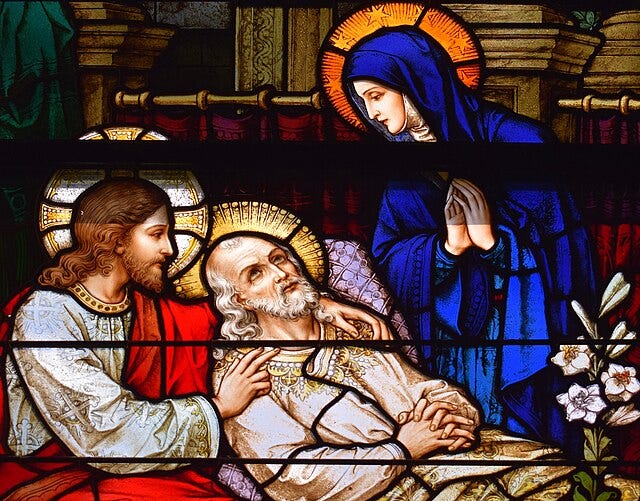The Bond of Perfection
Homily for December 29, 2024: Feast of the Holy Family

Today’s Gospel tells us of a time when Jesus was twelve years old. Seems like only days ago he was a newborn infant. They grow up so fast, don’t they?
Luke gives us this turning point in the life of the child Jesus, as the moment when he comes into his own. This is where Jesus speaks for the first time in Luke’s Gospel. After being told by angels and prophets who this child will be, we finally hear it in his own words. I must be in my Father’s house – a phrase which can also be translated as, I must be about my Father’s business.
Would that we could all have such a clear sense of purpose at the age of twelve! When I was that age I had dreams of one day being a cartoonist puppeteer filmmaker writer actor musician. No sense at that time of what I would ultimately be doing – though I will say that I have continued to carry all these passions with me into adulthood. So maybe that is the point at which we begin to define the person I would become.
And in the Gospel we also get some sense of how his parents deal with this shift in their son.
I’ve always found it interesting that this passage of scripture is the fifth Joyful mystery of the Rosary, but also the third of the Seven Sorrows of Mary. It is a bittersweet moment for any parent, to lose track of their child, find him again, and in finding him to realize that his feet are firmly set on a path of his own, he is beginning the journey into a life of his own independent of them.
But of course that is the ultimate goal of the family, isn’t it? To prepare the child to go out into the world, to help them advance in wisdom and age and favor before God and man.
Catholic teaching speaks of the family as the “Domestic Church” – as the beginning of a child’s social and religious formation, as the most basic unit of society in which we learn how to get along with other people. And we look to the Holy Family of Jesus, Mary, and Joseph as that shining example of the virtues of family life and the bonds of charity. The family is where we first learn to look after one another, to care for those who can’t yet care for themselves.
Or, for those who can no longer care for themselves.
Scripture doesn’t tell us anything about what happens to Joseph after this Gospel passage. All we know for sure is that he is not mentioned in any of the accounts of Jesus’s adulthood and public ministry. We presume he died some time in the intervening years. Some traditions suggest he was much older than Mary and may have simply passed from age.
We can certainly suppose that Jesus, raised in a good and devout Jewish family, knew of the instruction we hear from Sirach: the obligation to take care of your father when he is old, … even if his mind fail, be considerate of him. Whatever the circumstances of Joseph’s passing, we can safely assume that Jesus and Mary were a constant presence, to look after him and ease his final days.
Family is where, as St. Paul tells us in our second reading, we learn to put on heartfelt compassion, kindness, humility, gentleness, and patience, bearing with one another and forgiving one another. And as we learn these qualities in the context of our families, within our “domestic Church,” we should remember to bring them with us into the larger Church, into the community in which we live. Family is where we foster the virtues and attributes our society needs to thrive.
Our society these days tends to forget this. Our modern society, so hyper-focused on industry and institution, on business and productivity, too often ignores the importance of family.
In our modern hyper-industrious way of life our culture increasingly tries to ignore its non-productive members, those too old or too young to participate in a fast-paced, growth-oriented economy. It sidelines parental responsibilities, punishing those who prioritize family over career. Our world constantly puts pressure on us to be at the service of industry and leave the family to look after itself.
This is why we need to follow the example of Jesus, Mary, and Joseph. We need to work at nurturing those coming into life as well as those on their way out. We need to build a society that remembers where we all came from and recognizes where we are all going.
This is why we need this celebration of the Holy Family – this reminder that there is more to life than busy work. We need to prioritize the raising our young who are our future, and the support of our elders who are the wisdom of experience.

